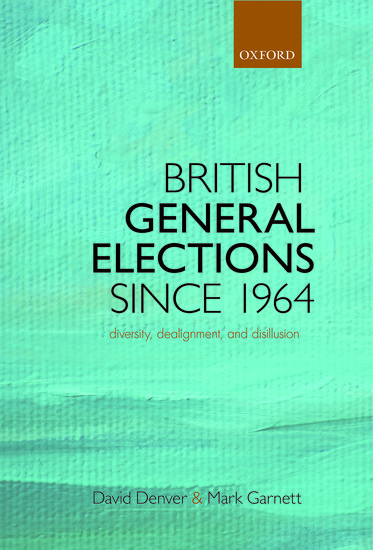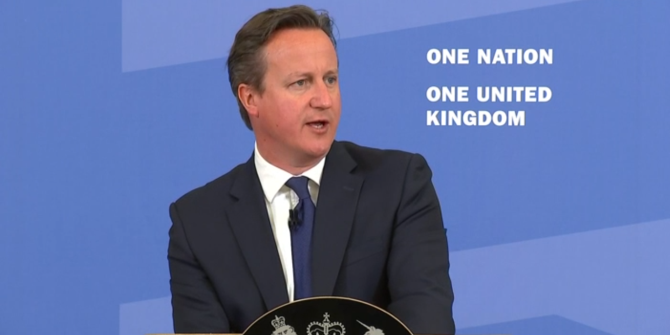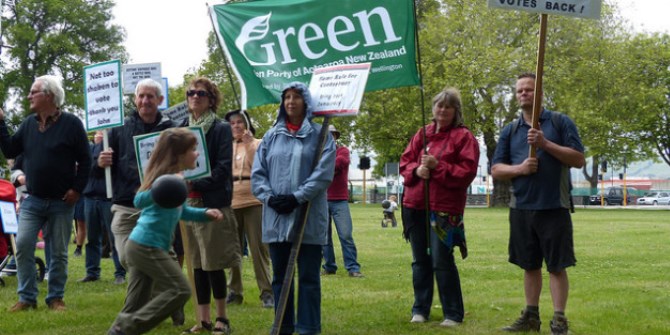This book reviews the history of British general elections since 1964, charting the changes in voters and parties at every step. In parallel, it shows how electoral analysts have responded to these developments. This enjoyable read is evidence that despite all the pressure for publications that will rate highly in the REF and have impact on the national economy there are still academics who will take the time to synthesise research findings into a format that deserves – and will surely get – a wide and appreciative audience, writes Ron Johnston.
 British General Elections since 1964: Diversity, Dealignment and Disillusion. David Denver and Mark Garnett. Oxford University Press. February 2014.
British General Elections since 1964: Diversity, Dealignment and Disillusion. David Denver and Mark Garnett. Oxford University Press. February 2014.
Books on contemporary history are currently very popular, as those of us who have lived through the post-1945 decades revisit our pasts while younger contemporaries try to discover what it is we view through rose-tinted spectacles. Elections get only minor coverage within those broad surveys – including works by Peter Hennessy, David Kynaston, and Dominic Sandbrook – however. Those interested in elections as major events, and their political contexts, have been well served by the Nuffield studies of each post-war general election – all but the most recent involving David Butler – and there is a wealth of more academic analyses, mostly of individual elections. Little has been written bringing all that material together since David Butler’s own shorter and more broadly-based British General Elections since 1945 (1989), a task now essayed by David Denver (himself a many-decades analyst of electoral behaviour) and Mark Garnett.
Denver and Garnett decided to start their book with the 1964 election, omitting the five preceding post-World War II contests on the grounds that only in 1964 were the ‘unmistakeable symptoms of a new era’ evident (reflected in the growth of TV watching and its use in electioneering, for example); they claim that students of contemporary elections have little to learn from the 1945, 1950 and 1951 contests (1955 and 1959 are not mentioned). This decision is defended in an excellent introduction, a valuable overview of relevant trends in British society generally since 1964, and of approaches to electoral study more specifically. (The use of British is entirely proper here and in the book’s title: Northern Ireland gets only miniscule treatment.)
The book’s main focus is on changes in the conduct of elections over the fifty-year period, as reflected in the five main chapters’ titles: ‘The way things were: elections, 1964-1970’; ‘‘Decade of dealignment’: elections, 1974-9’; ‘Conservative hegemony: elections, 1983-1992’; ‘The triumph of new Labour: elections, 1997-2005’; and ‘From Blair to Brown to Cameron and Clegg: 2005-2010 and after’. Each has a near-standard format comprising discussions of the political events in the Parliament leading up to each election, the campaign itself, and the results, followed by a general discussion of voting behaviour across the relevant contests. These latter sections focus on particular features during each period – such as turnout and the north:south divide – and are illustrated with useful graphics. Much is packed into each chapter, though there is never any sense of overkill; the result is an excellent series of contextual portraits of each election.
The book ends with a substantial ‘Conclusion: diversity, dealignment and disillusion’. This brings together the book’s main themes under seven headings: ‘The changed social context’; ‘Changed media’; ‘Change in electoral behaviour’; ‘Change in who gets elected’; ‘Change in the operation of the electoral system’; ‘Change in the parties’; and ‘Voters, elections and parties’ – ending on the downbeat note that we now have a disillusioned electorate which ‘does not bode well for the vitality of the electoral process in years to come’! Whether it is party membership or funding, turnout, campaigning methods, disproportionality and bias in the electoral system, or valence politics – Denver and Garnett provide the key information in a few paragraphs, plus the references where greater detail can be found if required.
This well-written book will provide an excellent text for undergraduate courses on recent British political history and the substantial changes that have taken place in elections and voting behaviour in the last fifty years. It draws extensively on the large research literature and associated materials – notably opinion poll data – but is entirely accessible to non-specialist audiences; indeed, in the book’s final paragraph they note that they ‘have resisted the temptation to use over-complicated statistics’. (So it is unfortunate that the only statistical analyses have little real import. There are several tables of correlation coefficients – reported to three decimal places. Many of them are very small – a coefficient of 0.203 accounts for only 4 per cent of the variation, for example; it may be statistically significant, because it is based on a large number of observations, but it tells us little!)
This enjoyable read is evidence that despite all the pressure for publications that will rate highly in the REF and have impact on the national economy there are still academics who will take the time to synthesise research findings into a format that deserves – and will surely get – a wide and appreciative audience.
——————————————–
Ron Johnston is a professor in the School of Geographical Sciences at the University of Bristol; his most recent contributions to electoral studies include (with Charles Pattie) Money and Electoral Politics (The Policy Press, Bristol, 2014) and (with David Rossiter and Charles Pattie) Equality, Community and Continuity: Reviewing the UK Rules for Constituency Distributions (available at http://www.mcdougall.org.uk/publications/papers.html). Read more reviews by Ron.








1 Comments